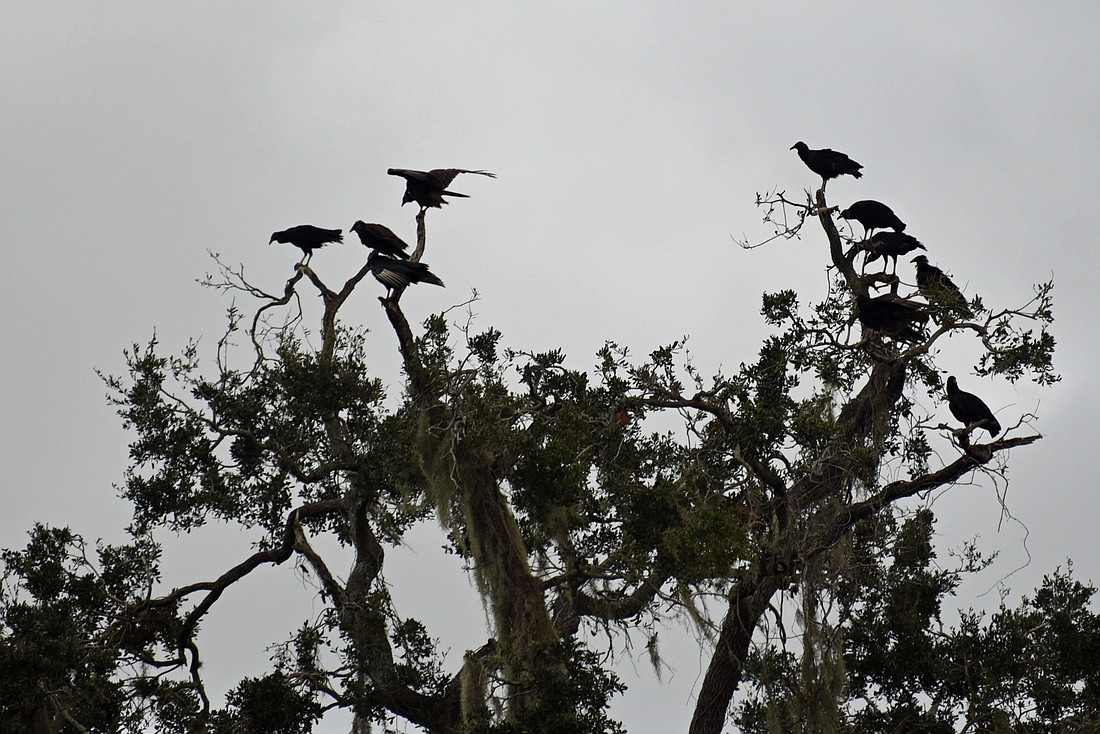- November 23, 2024
-
-
Loading

Loading

Nearly every day for the past month, Greenfield Plantation resident Steve Rich has tried desperately to manage a little ball of panic.
As soon as the fireworks start going off, his white and tan Shih Tzu, Wally, begins to shake and whine incessantly.
“There’s really no consoling him,” Rich said. “The only thing that solves it is to leave the area.”
So what are the fireworks from?
The Greenfield Plantation Homeowners Association has hired the U.S. Department of Agriculture Animal and Plant Health Inspection Services to control hundreds of vultures that roost within the community. The USDA cannot kill the migratory birds, so its goal is to get them to move. Its vulture abatement program offers three solutions, including shooting pyrotechnics at the birds as they prepare to land in the treetops where they roost. The idea is to scare them, keep them from landing and encourage them to find another place to stay.
The program also uses vulture effigies (there are some already hang in roosting trees in Greenfield Plantation) and lasers, which shine lights at the birds. Lasers typically work short term and must be combined with other harassment methods.
At Greenfield Plantation, the fireworks have proven most effective, said Jeremy Butts, assistant state director of the USDA’s APHIS Wildlife Services, noting vulture populations are up this year across the nation. The USDA has provided vulture harassment services intermittently at Greenfield Plantation since 2012.
But pet owners like Rich said the program is too disruptive, and not effective.
Marilyn Serbaty’s schnauzers, Casper and Barley, won’t go outside when she comes home from
work because they are too afraid of the noise.
Anita Hagen’s 10-year-old Wheaten terrier, Kinsey, becomes so upset that Hagen has started driving her around in the car for two hours at a time so Kinsey can’t hear the noise.
Rich has gone so far as to meet with a veterinary behaviorist and he even got Wally a prescription for Sileo, the only FDA-approved medication for canine noise aver- Greenfield residents want board to seek alternative methods to repel vultures.
They want the homeowners association to find a better solution.
The HOA generally sends out an email notifying residents that the pyrotechnics are coming, but the timeline is too vague to be helpful.
“There are more people who are impacted by this so-called cure than by the vultures,” Rich said. “I think they should come up with some alternative that doesn’t affect the animals,” said David Peck, who owns a Yorkie. “We want something else done.”
In years past, the fireworks for vulture abatement lasted only a few days. This year, however, it’s been four weeks and counting. The duration is proving disruptive and difficult on the animals, pet owners said.
Other pet owners in the neighborhood said the abatement program is working and is worth the noise. Beatriz Niemeyer, whose husband, Dennis, serves on the board, has two dogs —only one of which, Habibi — is negatively impacted.
“I’d rather have Habibi terrified,” Niemeyer said, adding the smell from vulture feces and prey carcasses waft through the air. “The last time we had the vultures this bad, I was considering selling the house.”
Mary Mahoney, a homeowner on Planters Manor Way, said her Catahoula dog, Yogi, “has a heart attack” every time he hears the fireworks and now even starts crying when he sees the USDA technician truck drive past the house. But, she still believes the program is needed.
“It’s necessary,” she said. “I feel bad for my dog, but the vultures are awful. Once the vultures start coming, there will be a complete herd. I’ve seen them sit 200 at a time on that tree over there.”
Homeowners Association President Kermit Floyd said the board believes the vulture abatement program is necessary.
“This board takes a proactive approach,” Floyd said.
Board members were sympathetic.
“It’s a legitimate concern,” board member Roger Simmons said of the noise used to scare away vultures.
However, fireworks, although disruptive, seem to be the most effective treatment, based on experience and research on solutions.
“It appears the vultures are now roosting in another area at night and then pass by our area on the way to the landfill,” board member Dennis Niemeyer said. “Before the abatement program, the trees would literally be covered with birds.”
Floyd said he would try to schedule a meeting with the USDA vulture abatement program technician to get a status update on abatement efforts and learn more about the program itself before the next HOA board meeting Jan. 26. The board has no immediate plans to change its strategy.